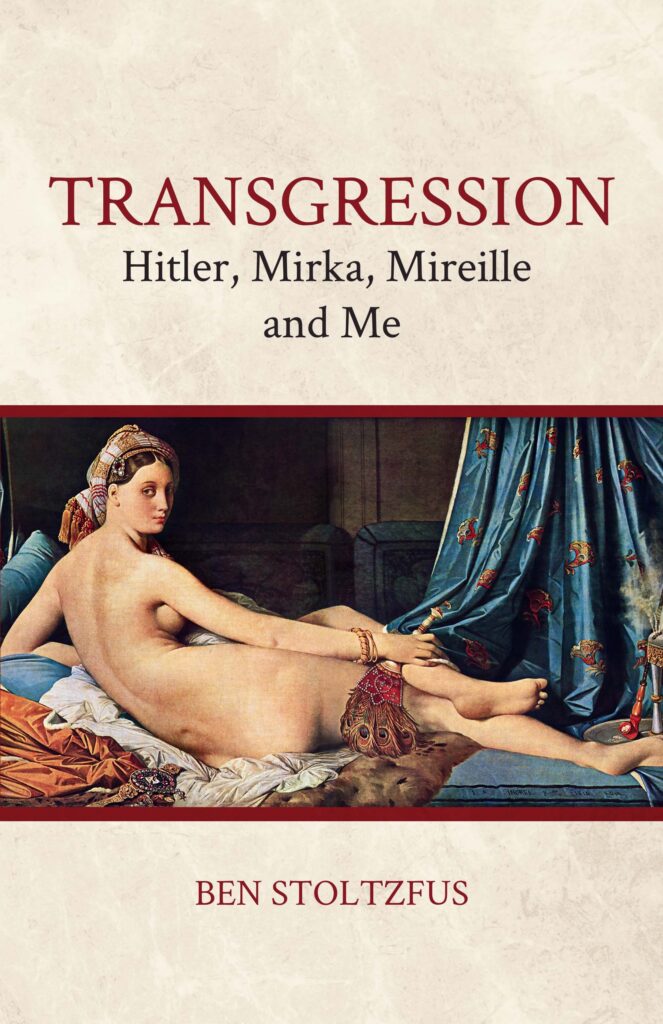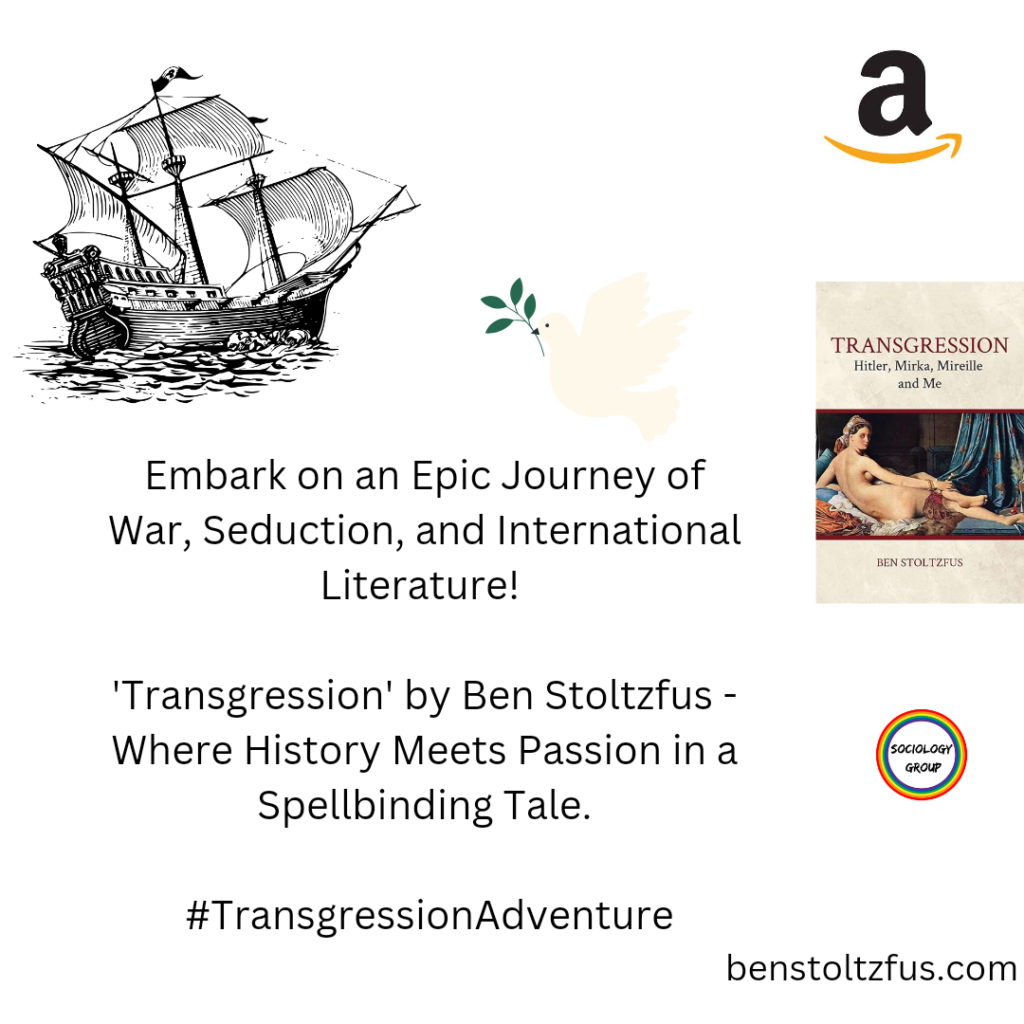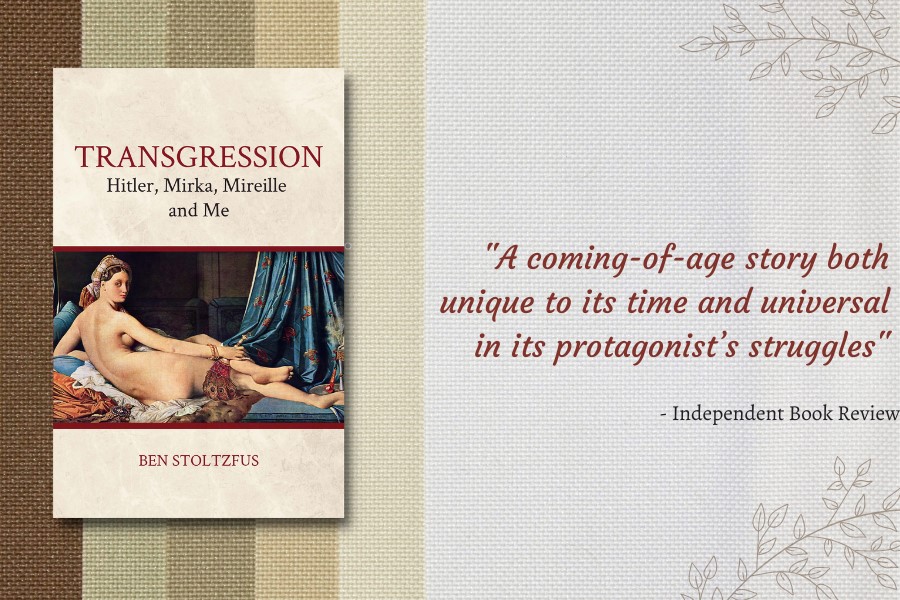TRANSGRESSION
Hitler, Mirka, Mireille and Me

A fourteen-year old American boy and his parents escape from the Nazi-occupied Balkans during World War II. They travel from Bulgaria through Turkey and the Middle East to America but danger pursues them on the Mediterranean and the Atlantic when their ship is attacked by a German submarine, and threatened by the battleship Tirpitz.
With compelling prose Stoltzfus makes each character come vividly alive: Mirka, a Gypsy, the family maid who seduces the boy, Mireille, a precocious French girl who introduces him to Baudelaire’s (Flowers of Evil) and Sade’s Philosophy in the Boudoir, his devout father, a pacifist, Archangel and Satan fighting over the boy’s soul, which he thinks is going in one direction but, because soul is all around him, is going everywhere and nowhere.
Although Transgression describes war and seduction, it is also a trip through international literature. Throughout the novel, the wind, flowers, nightingales and the symbolic colors in Oriental rugs foreshadow things to come. Hitler’s rants, Mirka, who resembles Ingres’ Odalisque on the book’s cover, Mireille, poetry and dreams appear as recurring tropes–images that are woven into the woof and weft of the writing process. They are the golden thread. Subtly honed with hallmark precision and keen insight, Transgression exemplifies the best in narrative art.

Look Inside
Reviews
Excerpts from reviews of Transgression: Hitler, Mirka, Mireille and Me by Ben Stoltzfus
“One of the most fascinating autofictions I have read over the past few years, Transgression is a page-turner and one of a kind too.” –Christian Moraru, Professor of American Literature & Critical Theory, University of North Carolina, Greensboro. Author of New Cultural History.
“In this new coming-of-age memoir/novel, … literature and early sex, while not uncommon as adolescent ladders out of the stone den of puritanism, find, in Stoltzfus’s beautifully poised prose, a lucid, powerful and archetypal enunciation here.” –John Diamond-Nigh, Professor Emeritus, Elmira College
“Stoltzfus’s command of engaging historical detail and cultural trappings, both significant and charmingly incidental, assures our attentive investment in the rites of passage for one and a passage of safety for all.” –Dwight Yates, Professor Emeritus, University of California
“Compelling, thoughtful, informative and engaging. [Stoltzfus is] truly an extraordinary writer! … In reading [his] work and [2022 Nobel Laureate Annie Ernaux’s] somewhat in tandem, I was struck by the similarity of [their] narrative approaches… Yet [Stoltzfus’s] work, a magnum opus of its own, is far richer in its exploration of the moral, philosophical, political, and artistic dimensions and in pursuing a voyage of discovery that ultimately melds the public and private realms. [His] “coming-of-age memoir/novel,” to use John Diamond-Nigh’s phrase, draws us into a consideration of issues that, we can now readily see, underlie the entire corpus of [his] artistic production. Christian Moraru is right, [Stoltzfus’s] book is a page-turner. I enjoyed it immensely, learned from it, smiled with it and, in short, was charmed by it.” —Roch Smith
Diane Donovan, in the Midwest Book Review, recommends Transgression highly for book discussion groups “that look for stories about maturity achieved during times of social, political, and personal chaos.”
Feathered Quill Book Reviews calls Transgression “a fascinating tapestry of youth’s hopes, ambitions and increasing understanding of the ways of the world, set against a background of war and destruction.”
Literary Titan has given the book a Silver Award, and “recommends Transgression to readers looking for an intellectually invigorating yet emotionally resonant historical fiction novel that provides a look at humanity during a monumentally difficult time in history.”
Kathy L. Brown, in the Independent Book Review, says: “Readers interested in first-person historical accounts as well as moral philosophy questions and coming-of-age stories will enjoy Transgression. [It is] replete with issues relevant to modern life and ripe for discussion on many levels.”
Goodreads users have given Transgression 4 stars, and list it as a “Want to Read Book.”
Reviewed by Barbara Bamberger Scott
A young man faces struggles for possession of his soul as he learns inwardly about love and outwardly observes a worldwide cataclysm unfolding, in this dynamic tale by author Ben Stoltzfus.
The book’s narrator is American, trapped with his family in Europe as the first rumblings of Hitler’s mad determination to take over the continent begin to be heard. In Sofia, the situation heats up with invasion, accompanied by bombing. The family will begin a slow journey eastward, through Istanbul, Beirut, Aleppo, and the Holy Land, before achieving a return to the sanctuary of the US. In the initial chapter, the teenager, some of whose friends are already experimenting with sex, will make his own discovery of feminine charms with a highly seductive gypsy girl, the Mirka of the book’s title. From their earliest intimacies, he, a highly read individual, will find himself in mental dialogue, consultation and verbal castigation with both Satan and an Archangel, each apparently vying for his soul’s attention and domination. When he and his father begin their journey to freedom, he reckons he will never see Mirka again, and as news slowly filters in regarding Hitler’s hatred of gypsies and Jews, he will probably be right in that assumption. But farther along in his journey – each new city and nation described in close-up human detail – he will encounter yet another easily adored muse in the form of Mireille, who will teach him French and enhance his familiarity with the female mind and body. As his trek continues, his father, a preacher, will share news and knowledge of Mahatma Gandhi, whose philosophy of satyagraha and his embrace of non-violence will deeply influence the young man, who, once his studies are completed, must consider whether to sign up for the draft.
Stoltzfus is a Professor Emeritus of Comparative Literature and Creative Writing, clearly well qualified to create and share the innate skills and sensitivities of his young protagonist. Each chapter of this highly readable work is named by place, as the teen and his family travel halfway around the world to escape the rigors and horrors of Hitler’s schemes, made plain by many quotations from that tyrant. The ugliness of worldwide conflict is balanced by the beauty of the two young women and the alluring possibility of true, universal peace. News of the conflict by radio and other sources peppers the narrative on almost every page. And the boy’s reading of classic and contemporary writers as well as his nascent plans to write a story expressing his deepest beliefs also provides rich fodder for readers.
Quill says: In Transgression, Ben Stoltzfus gathers skeins from many divergent sources to weave a fascinating tapestry of youth’s hopes, ambitions and increasing understanding of the ways of the world, set against a background of war and destruction.
Transgression: Hitler, Mirka, Mireille and Me by Ben Stoltzfus is an captivating autofiction written in first person narrative. In this fascinating story, the author presents his journey from the city of Sofia to America. The Nazi rule and the conditions of German-occupied places have been described in vivid detail by the author. The story is continuously moving from one place to another while the author explores the conundrum of youthful wishes and religious preaching’s.
This is a thought-provoking book that is very descriptive. The author has described everything around himself in detail. It is autofiction, which means it is a mixture of two different genres, i.e., autobiography and fiction. While reading this book, I also felt like I was reading a candid memoir. The protagonist of the book is the author himself. Readers have a limited point of view, and through this point of view we see the intriguing development of the author’s mind.
This book explores romance and youthful pleasures in Nazi Germany. Through subtle hints and indirect narration the author explains the political, economic, and social conditions of the world at that time. There was a constant battle between good and evil in the author’s mind and this gives readers an interesting peek into the author’s thinking. This book is much more than just an autobiography; it has a huge part of history infused in it. The author has done a brilliant job in relaying small details and facts in subtle ways throughout the book that make the story feel authentic.
This is an eloquent portrayal of the people living and leaving Germany during Nazi-occupation. The instances of hiding and bombings are excruciatingly realistic. The fear of survival yet the normalcy of buying food items from the market, studying, and thoughts of settling in the future shows readers the stark contrast of that time.
I recommend Transgression to readers looking for an intellectually invigorating yet emotionally-resonant historical fiction novel that provides a look at humanity during a monumentally difficult time in history.
Transgression describes itself as “autofiction”—a fictionalized memoir. It is the tale of a gifted, curious, and precocious American teen as he reconciles the fundamentalist religious teachings ingrained in his heart and mind with his spiritual quest, intellectual rigor, and sexual longings. His internal conflicts mirror dangerous conflicts in the world around him; Hitler’s aggressions and World War II’s events form the background of his life.
Stoltzfus’s parents are American educators working in Bulgaria at an international school. Life is good for the family. The household is devout in the Congregationalist religion, and the protagonist has also attended Catholic school. He is a bright, mature child who has internalized most everything he’s been taught. But his twin obsessions with burning in hell and sex create an almost constant state of conflict within him.
“My spirit has also been Balkanized, split and parceled like Bulgaria…my parents are Congregationalists, and I, after each Catechism lesson, am beginning to think like a Catholic.”
World events quickly overcome the family’s idyllic life as well as that of everyone around them. From Jewish friends changing their names’ spelling to growing scarcities of basic items, things aren’t looking good. When Germany invades and occupies Bulgaria, the family must flee, thus initiating a multi-year refugee experience. Coinciding with this upheaval, the protagonist struggles mightily with the meaning of good and evil in his personal life. What is sin? Where does redemption lie? What is a person’s soul and how can one guard it?
Stoltzfus and his friend Mireille love to read and discuss books, especially banned books (now considered classics). Thus, Transgression is also a story about the written word: its value, not merely as entertainment but also as a source of multiple insights into the human experience.
The narrator shares his story in the first person, present tense. The voice is that of a mature individual deep in revery rather than that of the young person experiencing the events. The story episodes are memories, coming, as memories do, in a stream of thought.
“White seeps through the cracks. Memory. White, like city sounds sifting through leaves, slops through winter branches. The tree trunks are black crows on a snowbank, like punctuation marks, dot the landscape. The crows become magpies, and the magpies are the white collar and black robe of Brother Ignatius. No, they are now black crosses on the fuselage of Junker airplanes. They are black swastikas…”
Skillfully utilized literary techniques hold the reader in the narrator’s memories. The story is told in summary—that is, descriptions of events (as opposed to scenes, in which the event is “acted out” by the characters). For example, dialogue is marked by a colon and run together into a paragraph. The lyrical voice is replete with figurative language, at times stark but often as intricately designed as the Persian rugs Mrs. Stoltzfus loves to collect. Although generally linear, the narrative often shares episodes of varying degrees of consequence with equal emphasis. The narrator’s introspective moments, often humorous, illuminate a growing maturity and rich interior life.
A fundamentally life-changing event for the narrator occurs early in the story. It precipitates the spiritual crisis that haunts him through most of the book. This event is recognized as a crime in 2022, and although ultimately the narrator understands he had no actual culpability, no hint of that insight occurs through most of the story. Since the book voice is that of the narrator in maturity, this omission is troublesome to this reader.
Readers interested in first-person historical accounts as well as moral philosophy questions and coming-of-age stories will enjoy Transgression. Replete with issues relevant to modern life and ripe for discussion on many levels, Transgression would be a great choice for a book club.
Interviews
Today, Feathered Quill reviewer Barbara Bamberger Scott is talking with Ben Stoltzfus, author of Transgression: Hitler, Mirka, Mireille and Me.
FQ: Have you traveled to or established any personal ties to the countries you write about; if so, how does that contact affect your current thinking?
STOLTZFUS: I was born in Bulgaria. I have visited Istanbul many times. I lived in Beirut for two years, and I have been to the Holy Lands. I know them all reasonably well. I lived in Bulgaria for twelve years, but all that was in the 1930s and 1940s during World War II. I have been back to Bulgaria to see friends, and to Turkey on a number of occasions since then, but not to the Middle East. My present thinking about these countries depends on current events and the political situation from year to year.
FQ: You use examples from the Bible, from great literature and from the teachings of Gandhi to illustrate certain points; are any of your own spiritual views reflected in those widespread references?
STOLTZFUS: I would say that the New Testament reflects many of my ethical views, particularly The Sermon on the Mount. Gandhi’s satyagraha, meaning do no harm, and his advocacy of non-violent resistance have been guiding principles in my thinking and actions.
As for literature, D.H. Lawrence, Baudelaire, Rimbaud, Blake, Dostoevsky, and many others have been influential, not only for their styles and aesthetic views but also for their insights into the complexities of life.
FQ: What single piece of advice would you give to a person preparing to read your work with no previous knowledge of its content?
STOLTZFUS: Sit back, open your mind, and enjoy.
FQ: Did you have any direct or, as in your book, indirect experience of World War II or any other major war and if so, how did that blend with your construction of Transgression?
STOLTZFUS: I, like the narrator of Transgression, lived in Bulgaria for two years, when the Germans occupied the Balkans. I, like the narrator, was also in the Middle East, the crossing of the Mediterranean, and the crossing of the Atlantic. The World War II events that the narrator describes in the novel are accurate historically because I, the author, lived through them—some directly, most of them indirectly. The separate war that the narrator wages with dogma echoes the battles of World War II in Europe and North Africa, with one major difference: the narrator finds his soul and peace while he is Beirut in 1944. World War II ends with the dropping of the A-bomb on Hiroshima and Nagasaki in 1945. World peace comes one year later than the narrator’s peace of mind.
FQ: Does positing and writing about an oppressive regime and the ways it might be overthrown or reformed give you a sense of hope?
STOLTZFUS: Let’s just say that the narrator finds peace of mind and hope only after waging many battles with the religious dogma that was sending him to hell. As for overthrowing regimes, it must be done nonviolently, because the means determine the ends.
FQ: What sources most guided you in arranging the chronology of WWII in your book?
STOLTZFUS: I didn’t arrange the chronology of World War II. Events happened as the war unfolded. At the time, when I was living through them, there was the radio, mainly the BBC.
FQ: Your hero does a lot of reading. Do you have any personal favorites among the books and authors included in this story?
STOLTZFUS: See question 2, paragraph 2.
FQ: Do you have plans for your next literary endeavor?
STOLTZFUS: I’m writing a biofiction of my wife entitled Big JP: The Nine Lives of Judith Palmer. She survived two drownings, a disastrous first marriage, an LSD overdose, two years with a psychiatrist, and much more. It’s her biography combined with the fictions I have written about episodes in her life, and her collaboration with me on the pictonovel, Romoland. This hybrid combines my fictions and 25 images of a woman-artist (Judith is an artist) striving to find a voice in an oppressive phallocratic environment. Her images speak. My writing sees.
1. Transgression follows a boy and his parents as they escape the Nazis during WWII and face danger as they make their way to America. Why was this an important book for you to write?
I was the last American boy to leave Bulgaria in 1942 after the Nazi occupation of the Balkans. It seemed important to document that fact as well as life for Americans at ACS, the American College in Sofia.
The novel is in four parts: Sofia, Istanbul, the Middle East, and America.
Writing Transgression was a catharsis. I wanted to show readers how to expunge doxa, i.e., ready-made values and beliefs transmitted by family, schools and the church; especially when doxa interferes with the maturation and wellbeing of a teenager.
Transgression is part of a trilogy: The Eye of the Needle (Viking, 19967) and Valley of Roses (Cypress-Trafford, 2003) are set in Bulgaria during WWII. They narrate similar themes. Like Virginia Woolf’s The Waves, cinematic montage in The Eye of the Needle frames the world through the mind’s eye of one person.
2. What scene in the book was the most emotionally impactful for you to write?
There were four scenes: a. Archangel taking the boy’s soul on a wild ride down the Himalayas, floating it on the Ganges River into and over the Indian Ocean, down the Nile, west across the Mediterranean Sea, and south through the Sahara Desert past Ouagadougou to the jungle in Central Africa. I wanted to communicate the “emotional hurt” that Archangel and Satan were inflicting on the boy.
b. The narrator’s and Mireille’s love scene after reading Baudelaire’s Flowers of Evil; especially the poem “To One Who Is Too Cheerful.” There are two parts to the love scene: one scene describes what happened and the other one describes what the boy imagined would happen; both scenes were written with words. Was one more real than the other, and, if so, which one?
c. The evening after the baptismal scene when the boy walks along the shoreline of the Sea of Galilee, looks at the stars in the sky, locates Orion, the hunter, who also walked on water, listens to the lapping of the wavelets, and feels a oneness with creation.
d. The Eureka moment when the narrator realizes that he is not going to hell because his soul is all around him, going everywhere and nowhere.
3. What were some themes that were important for you to explore in this book?
My answers above explore and explain four themes that were important to me.
A fifth theme was structural foreshadowing: Describing the wind in the trees outside Sofia, the clicking of the palm fronds in Beirut, and the wind in the trees on the farm on Germany Hill, New York; these and others like them are all part of the boy’s experience. Throughout the novel I wanted events and images to echo each other, from beginning to end.
Flowers are also an important foreshadowing theme, beginning with the narrator’s botany collection and the language of flowers as metaphors of seduction by Mirka. Following that, Baudelaire’s Flowers of Evil play an important role in the boy’s relationship with Mireille; they echo Mirka’s earlier seduction.
Fear is a theme: fear of internment by the Germans, fear of going to hell, fear of a submarine attack in the Mediterranean Sea by a German submarine, and fear that the battleship Tirpitz will attack the fifty-ship convoy crossing the Atlantic Ocean. The Bermuda Triangle functions as a hoax fear.
Books and writing are important themes. From part one of Transgression to the end, the novels, plays, and poetry of American, British, French, German, Greek, and Russian authors help the boy navigate through mazes of doxa. The Bible is frequently invoked.
Nightingales are another theme: the birds warble in the woods outside the boy’s house in Bulgaria; they sing all night during his parents’ honeymoon in Shiraz, Iran; they trill in the foothills of Mount Sannine north of Beirut; and the narrator writes a paper for his English teacher entitled The Nightingales in Literature. He even builds a birdhouse, hoping to attract a nightingale.
Oriental rugs and the symbolic colors in their patterns are yet another theme. They appear in Istanbul, in Aleppo, in Beirut, and in a friend’s house by the Sea of Galilee. Many foreshadowing images and metaphors are woven into the woof and weft of the writing process. They are the figure in the carpet–the golden thread.
Music is a theme, starting with Lily Marlene, a nostalgic song for the girl left behind. It was popular with both German and Allied soldiers who sang it in German and in English; also, the very popular and ubiquitous “dream” songs such as Dream, I Dream of You, Buy the Dream, and My Dreams Are Getting Better All the Time–Big Band songs that were heard in Europe, the Middle East, and America.
Capturing the sounds and colors of an outdoor food market in Istanbul was a challenge. I tried to use the connotations of words and the rhythms of language to capture the auditory and visual impact of vendors hawking their foods in high-pitched melodious voices.
Another challenge was describing the song of a nightingale–its joyful warbling and trilling in Sofia and Beirut that awaken the boy in the middle of the night.
All kinds of sounds echo each other. So do colors.
Stars, particularly Orion, play an important role. You see them in the night sky above the Sea of Galilee, above the pyramids at Giza, and in many other places.
Hitler and war are constant themes. Transgression begins with Hitler’s invasion of Poland in 1939 and ends with the dropping of the A-bomb on Hiroshima and Nagasaki; the fighting scenes in Europe and North Africa are objective correlatives for the boy’s private battles with Archangel and Satan. Descriptions of the 1916 Turkish genocide of Armenians predates Hitler’s death-camps where Jews, Roma, and other “undesirables” were killed.
Flaubert uses foreshadowing images that anticipate future ones in Madame Bovary and so does Hemingway in A Farewell to Arms.
4. What is the next book that you are working on and when will it be available?
I’m working on a book entitled Baja: The Puma Drinks the New Moon. It’s a collaborative venture with Judith Palmer, my artist wife. Her pen-and-ink drawings and photo-etchings accompany my 70 haiku and illustrate our travels over the years, up and down the Baja peninsula. They embellish the topography, the flora, and the fauna of the region. The book will probably come out sometime in 2023.

Purchase


